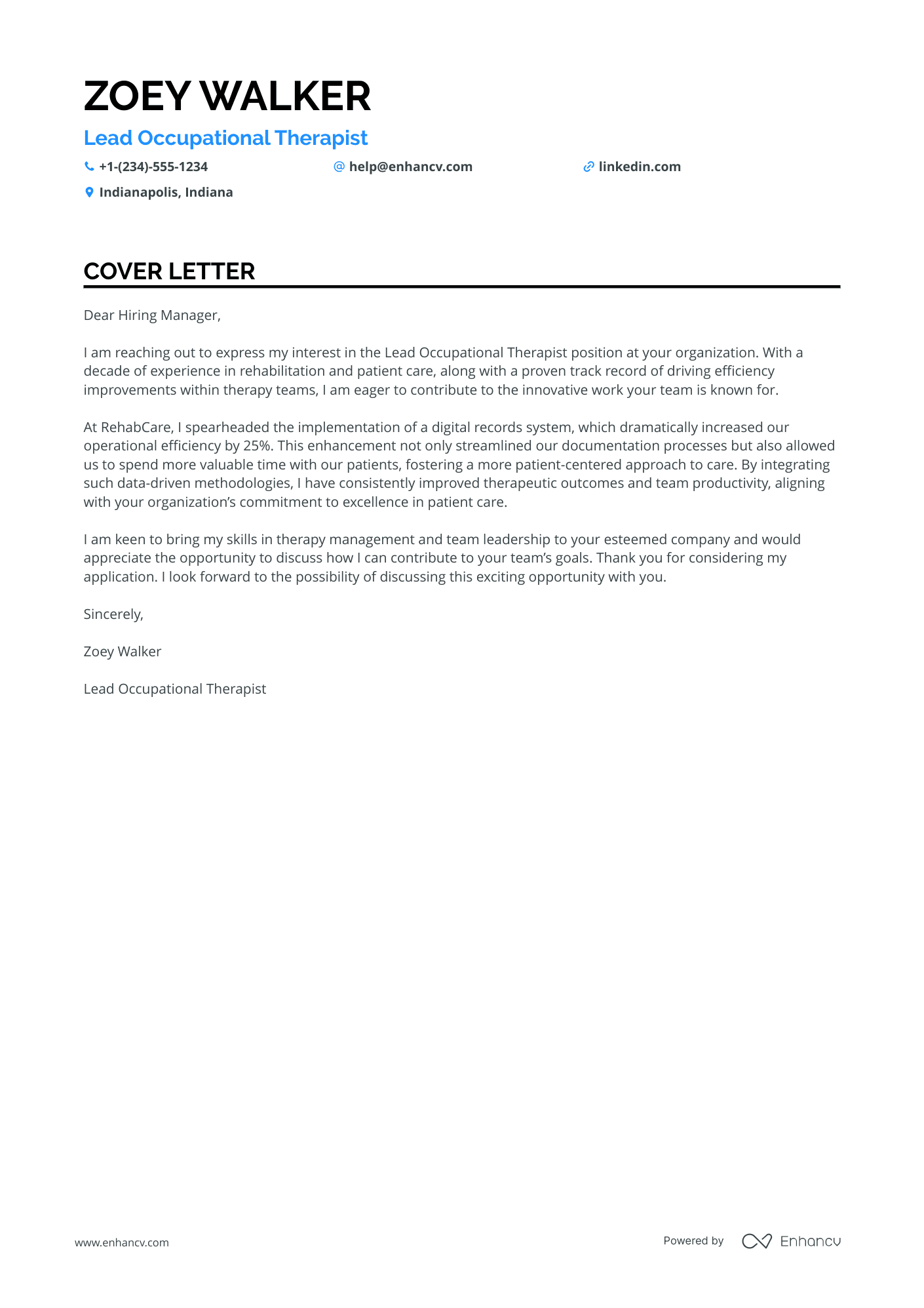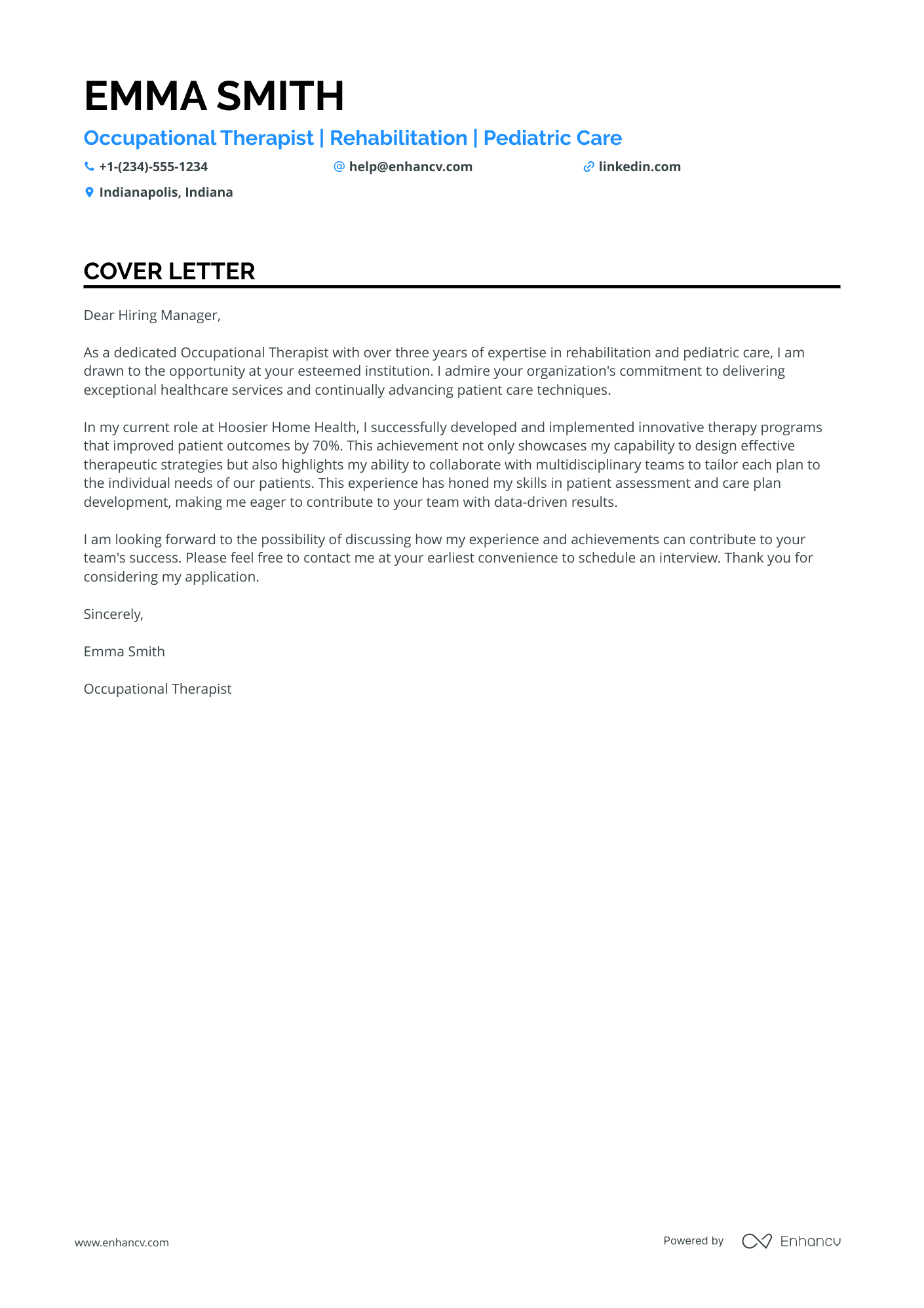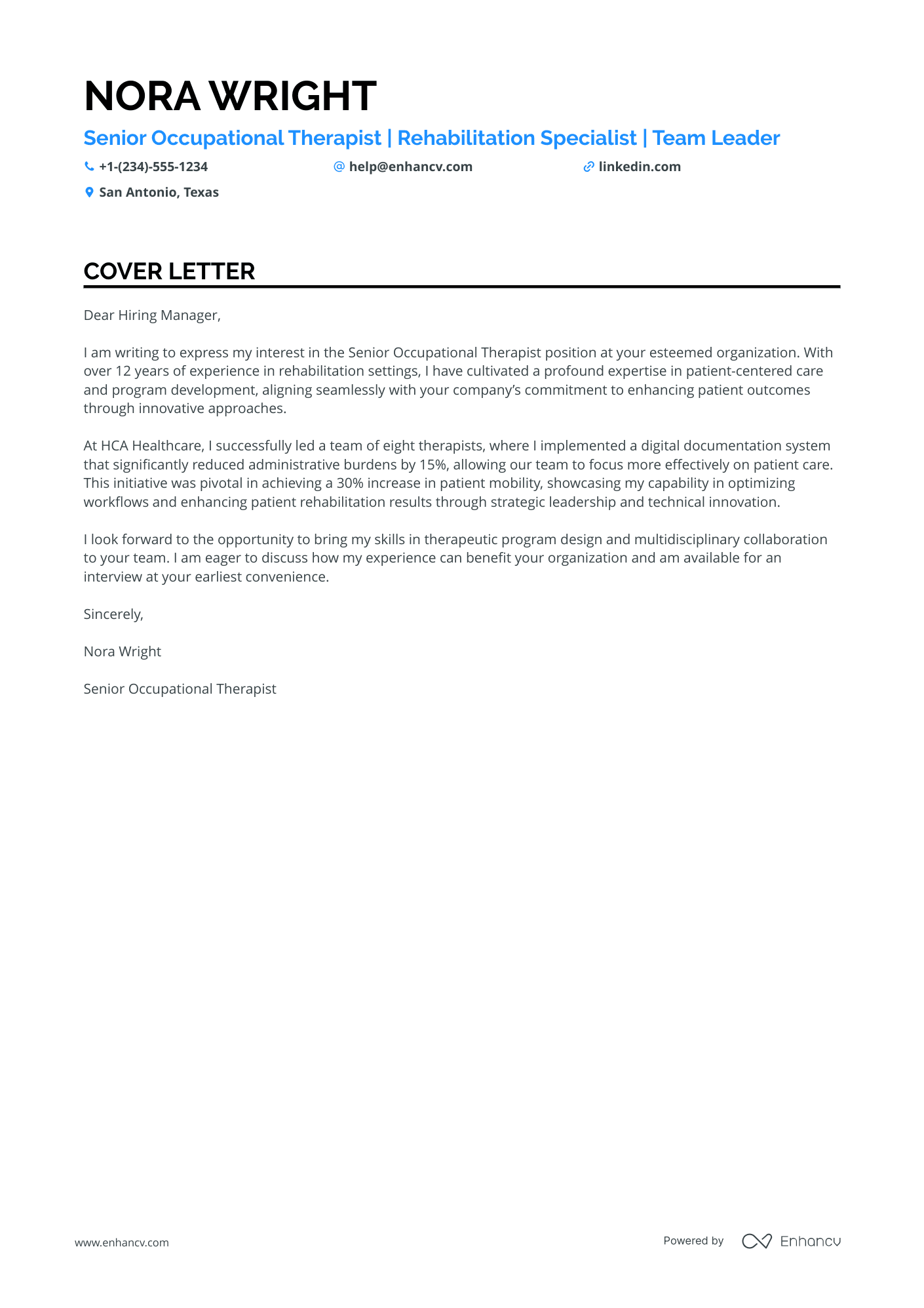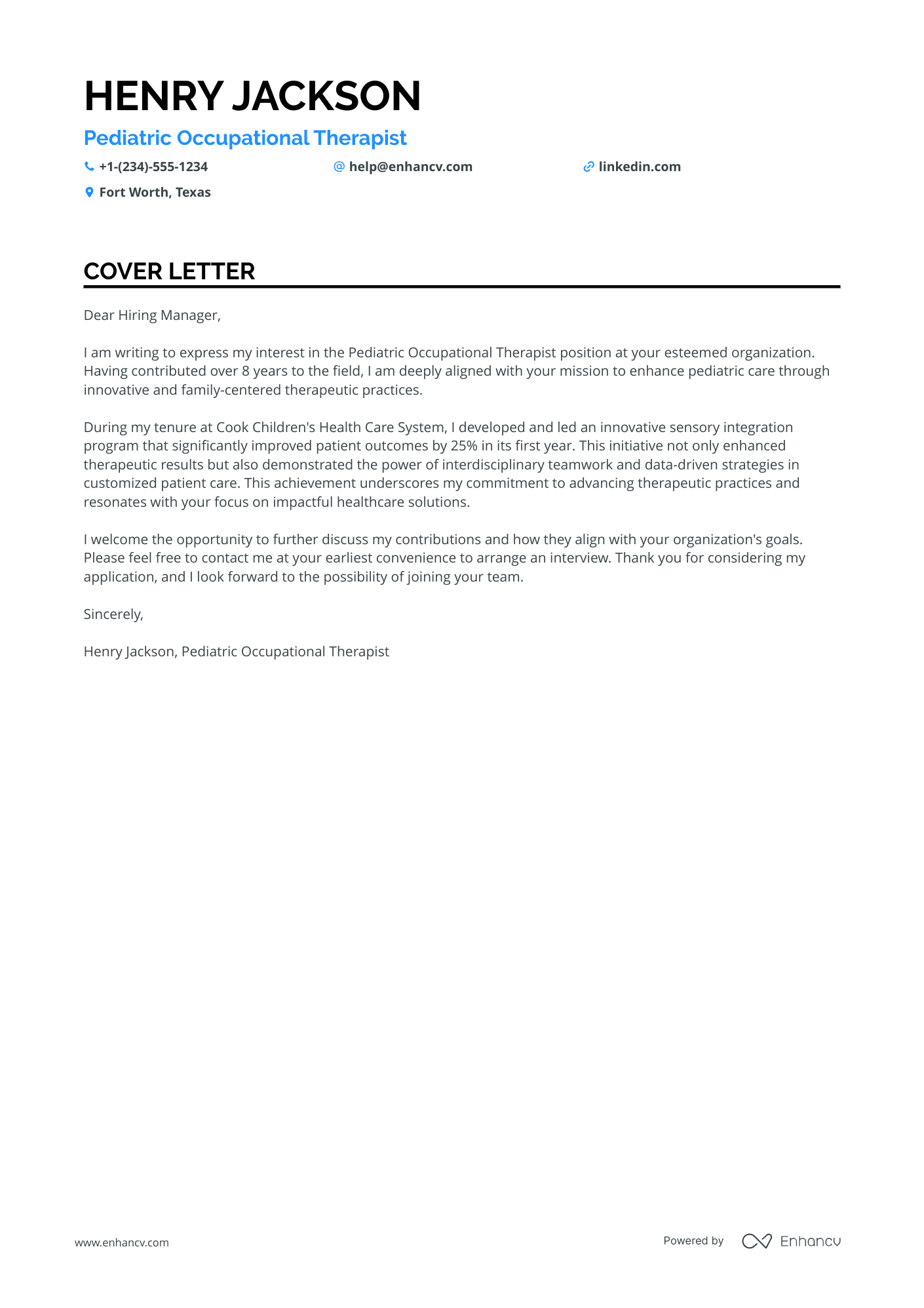As you embark on your journey to secure your dream role, crafting a compelling occupational therapist cover letter can be a stumbling block. You've fine-tuned your resume, but your cover letter can't just echo it—it needs to spotlight your proudest professional achievement with a personal touch. Keeping formality intact and steering clear of clichés, aim to convey your story succinctly within a one-page limit. Let's explore how you can combine professionalism with personality to make your application stand out.
- Introduce your profile to catch recruiters' attention;
- Use professional templates and examples to make sure your occupational therapist cover letter follows the best industry standards;
- Settle on your most story-worthy achievement to shine a light on what makes your application unique;
- Write a occupational therapist cover letter, even when you lack professional experience.
Ready to start with the basics: upload your resume to Enhancv's AI, below, to see the occupational therapist cover letter it would write for you.
If the occupational therapist isn't exactly the one you're looking for we have a plethora of cover letter examples for jobs like this one:
- Occupational Therapist resume guide and example
- Veterinary Technician cover letter example
- Psychologist cover letter example
- Dietician cover letter example
- Ob Nurse cover letter example
- Licensed Practical Nurse cover letter example
- Child Care Worker cover letter example
- Registered Nurse cover letter example
- Social Worker cover letter example
- Associate Dentist cover letter example
- New Dentist cover letter example
Drop your resume here or choose a file.
PDF & DOCX only. Max 2MB file size.
Occupational therapist cover letter example
SAMUEL MOORE
Denver, Colorado
+1-(234)-555-1234
help@enhancv.com
- Quantifying achievements, such as increasing adherence to treatment plans by 25% and enhancing team efficiency by 30%, provides tangible evidence of the candidate's impact and skills.
- Discussing a specific initiative like the development of a cross-disciplinary training program showcases leadership and innovation, and demonstrates the candidate's commitment to team collaboration and improving patient care.
- Mentioning a high patient satisfaction rate (95%) emphasizes the candidate's dedication to quality care and their contribution to positive patient outcomes, which is critical in healthcare roles.
- Expressing eagerness to further discuss the candidate's fit for the role encourages the potential employer to proceed with an interview, moving the application process forward.
The must-have sections and format of your occupational therapist cover letter
When writing your occupational therapist cover letter, keep in mind that it'll only be read by the recruiters and not the Applicant Tracker System (or software used to assess your profile). That's why you should structure your content with a/an:
- Header (apart from your contact information, include your name, the role you're applying for, and the date);
- Personalized salutation;
- Opening paragraph to win the recruiters over;
- Middle paragraph with key details;
- Closing that starts from clichés;
- Sign off (that's not mandatory).
Industry standards dictate your paragraphs to be single-spaced and to wrap your content in a one-inch margin. Designing your occupational therapist cover letter, refer to one of our templates, which automatically takes care of the spacing and margins.
Choose the same font for your occupational therapist cover letter as you did for your resume: the likes of Lato and Bitter would help you to stand out in a sea of cover letters in Arial or Times New Roman.
Export your whole occupational therapist cover letter from our builder in PDF to keep the same formatting and image quality.
Tight on time? Our free cover letter generator helps you create a cover letter instantly from your resume.
The top sections on a occupational therapist cover letter
- Header: Includes your contact information, date, and the employer's details; it's essential for providing your professional information and for the letter's formal layout, which is typical for healthcare professionals.
- Greeting: Address the hiring manager or recruiter by name if possible; personalization is important, showing that you've taken the time to research who is in charge of hiring, which reflects well on your attention to detail as an occupational therapist.
- Introduction: Briefly introduce yourself, stating your current role or recent occupational therapy experience; this sets the stage for your qualifications and interest in the position.
- Body: Highlight your relevant experience, specific occupational therapy skills, patient success stories, and your understanding of the facility's patient population or specialization; this demonstrates your fit for the role and your commitment to patient care.
- Closing: Reiterate your enthusiasm for the position, include a call to action (e.g., looking forward to discussing your fit for the role in an interview), and express gratitude for the opportunity to apply; it's your final chance to make a memorable impression and express professionalism inherent to healthcare roles.
Key qualities recruiters search for in a candidate’s cover letter
- Adaptive and creative problem-solving skills: to tailor therapeutic interventions to the unique needs of each client.
- Strong interpersonal and communication skills: for effectively working with clients, their families, and other healthcare professionals to optimize care.
- Knowledge of a wide range of conditions: to understand the physical, mental, and social needs of clients with varying disabilities and illnesses.
- Proficiency in therapeutic techniques and assistive technology: to provide appropriate interventions and recommend aids that improve clients' quality of life.
- Patience and empathy: to support clients through their rehabilitation process, which can sometimes be slow and frustrating.
- Commitment to continuing education: to keep up to date with the latest research, therapeutic methods, and best practices in occupational therapy.
What greeting should you use in your occupational therapist cover letter salutation
A simple "Hello" or "Hey" just won't work.
With your occupational therapist cover letter salutation, you set the tone of the whole communication.
You should thus address the hiring managers by using their first (or last name) in your greeting.
But how do you find out who's recruiting for the role?
The easiest way is to look up the role on LinkedIn or the corporate website.
Alternatively, you could also contact the organization via social media or email, for more information.
Unable to still obtain the recruiter's name?
Don't go down the "To whom it may concern path". Instead, start your cover letter with a "Dear HR team".
List of salutations you can use
- Dear Hiring Manager,
- Dear [Specific Name of the Hiring Manager],
- Dear [Name of the Department] Team,
- Dear [Name of the Practice or Clinic Owner],
- Dear Dr. [Last Name],
- Respected [Name of the Recruiter],
Your occupational therapist cover letter intro: showing your interest in the role
On to the actual content of your occupational therapist cover letter and the introductory paragraph.
The intro should be no more than two sentences long and presents you in the best light possible.
Use your occupational therapist cover letter introduction to prove exactly what interests you in the role or organization. Is it the:
- Company culture;
- Growth opportunities;
- Projects and awards the team worked on/won in the past year;
- Specific technologies the department uses.
When writing your occupational therapist cover letter intro, be precise and sound enthusiastic about the role.
Your introduction should hint to recruiters that you're excited about the opportunity and that you possess an array of soft skills, e.g. motivation, determination, work ethic, etc.
What to write in the middle or body of your occupational therapist cover letter
Here's where it gets tricky.
Your occupational therapist cover letter body should present you in the best light possible and, at the same time, differ from your resume.
Don't be stuck in making up new things or copy-pasting from your resume. Instead, select just one achievement from your experience.
Use it to succinctly tell a story of the job-crucial skills and knowledge this taught you.
Your occupational therapist cover letter is the magic card you need to further show how any organization or team would benefit from working with you.
Time to wrap up your occupational therapist cover letter
Writing the closing paragraph of your occupational therapist cover letter is just as important as the salutation.
You have to make it personalized to the job advert and recruiter.
Experienced professionals advise candidates to end with a request or reminder for follow-up. Write that you're grateful for the opportunity, and, at the same time, hint that you're available for the next steps of the process.
Otherwise, you could also conclude your occupational therapist cover letter by facing the future. How do you see yourself, as part of the team? In particular, how would you settle in your new role in the first six months to a year?
Which story should you tell in your occupational therapist cover letter when you have zero experience
Candidates, lacking professional experience in the field - this one is for you.
Your occupational therapist cover letter is an exercise of integrity, honesty, and, above all, spinning a positive narrative around your strengths.
And what better way to capture recruiters' attention than with your most job-relevant achievement (this could be from your internship or volunteering experience)?
Make sure to back up your success with transferrable skills that are relevant to the job (e.g. how your year, studying abroad, has taught you to be more motivated and handle multicultural environments).
Another safe card you can bet on is your career dream: in the body of your occupational therapist cover letter, go into the details of how your ambitions would help make the company you're applying for better.
Key takeaways
Creating your occupational therapist cover letter should be a personalized experience for the role and the recruiter, where you:
- Format your cover letter using the same ATS-friendly font (e.g. Railway) as you did for your resume;
- Greet recruiters, using their name, and follow up with two sentences to introduce yourself, your interest in the role, and to stand out;
- Map out one key success from your career (or life) that has taught you job-crucial skills;
- Substitute your lack of experience with an achievement from your internships, degrees, or volunteering gigs;
- End with a promise for your potential or your availability for an interview.
Occupational Therapist cover letter examples
By Experience
Lead Occupational Therapist
- Highlighting specific achievements, such as the implementation of a digital records system, which demonstrates an ability to innovate and improve efficiency, essential skills for a leadership role in occupational therapy.
- Emphasizing experience in improving operational efficiency and patient care, aligning with the organizational goal of enhancing care quality, crucial for a managerial position.
- Demonstrating a history of successful team leadership and management, showcasing capability in guiding teams towards achieving therapeutic outcomes, which is vital for leading a therapy department.
- Expressing a genuine interest in contributing to the prospective employer’s specific goals, creating a connection between the candidate’s experience and the organization’s mission.
Entry-Level Occupational Therapist
- Customization: The cover letter is specifically tailored to the organization, showing admiration and alignment with the institution's values, which is crucial for demonstrating genuine interest and fit for the role.
- Achievements and Impact: By highlighting a significant achievement—improving patient outcomes by 70%—the candidate effectively demonstrates their ability to drive results and adds credibility to their expertise.
- Skills in Collaborative Care: Emphasizing experience in working with multidisciplinary teams showcases the candidate's ability to work collaboratively, a key skill in the healthcare sector.
- Call to Action: The candidate expresses eagerness for an interview and provides contact information, showing proactiveness and facilitating the next steps in the hiring process.
Senior Occupational Therapist
- Highlighting Leadership and Innovation: The cover letter emphasizes leadership skills and innovative contributions, such as leading a team and implementing a digital documentation system. This showcases the candidate's ability to drive improvements and enhance efficiency in healthcare settings.
- Emphasizing Measurable Successes: Specific achievements, like the 30% increase in patient mobility, are quantified, demonstrating the candidate's impact and ability to achieve tangible results, which is impressive to potential employers.
- Aligning with Organization's Values: Mentioning the alignment with the company's commitment to enhancing patient outcomes shows that the candidate understands the organization’s goals and values, which is crucial for demonstrating fit and dedication.
- Focus on Relevant Experience: The cover letter succinctly communicates the candidate’s over 12 years of experience, immediately establishing their credibility and depth of knowledge in the field of occupational therapy.
By Role
Pediatric Occupational Therapist
- Highlighting Specific Achievements: Mentioning concrete achievements, like improving patient outcomes by 25%, demonstrates the candidate's ability to make a significant impact in the role.
- Alignment with Company Mission: Expressing alignment with the organization's mission shows that the candidate has a genuine interest in the role and is motivated by the company's core values.
- Leadership and Innovation: Showcasing experience in leading and developing a new program highlights leadership skills and the ability to innovate, which are crucial for growth and adaptation in a pediatric occupational therapy role.
- Commitment to Interdisciplinary Collaboration: Emphasizing the importance of teamwork and collaboration across disciplines underlines the candidate's understanding of holistic care approaches, essential in pediatric therapy settings.













